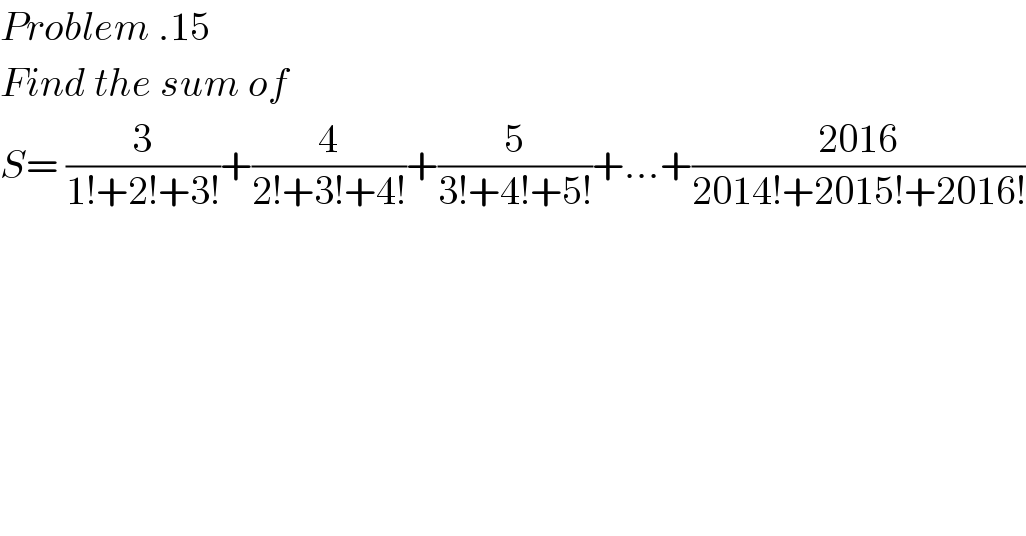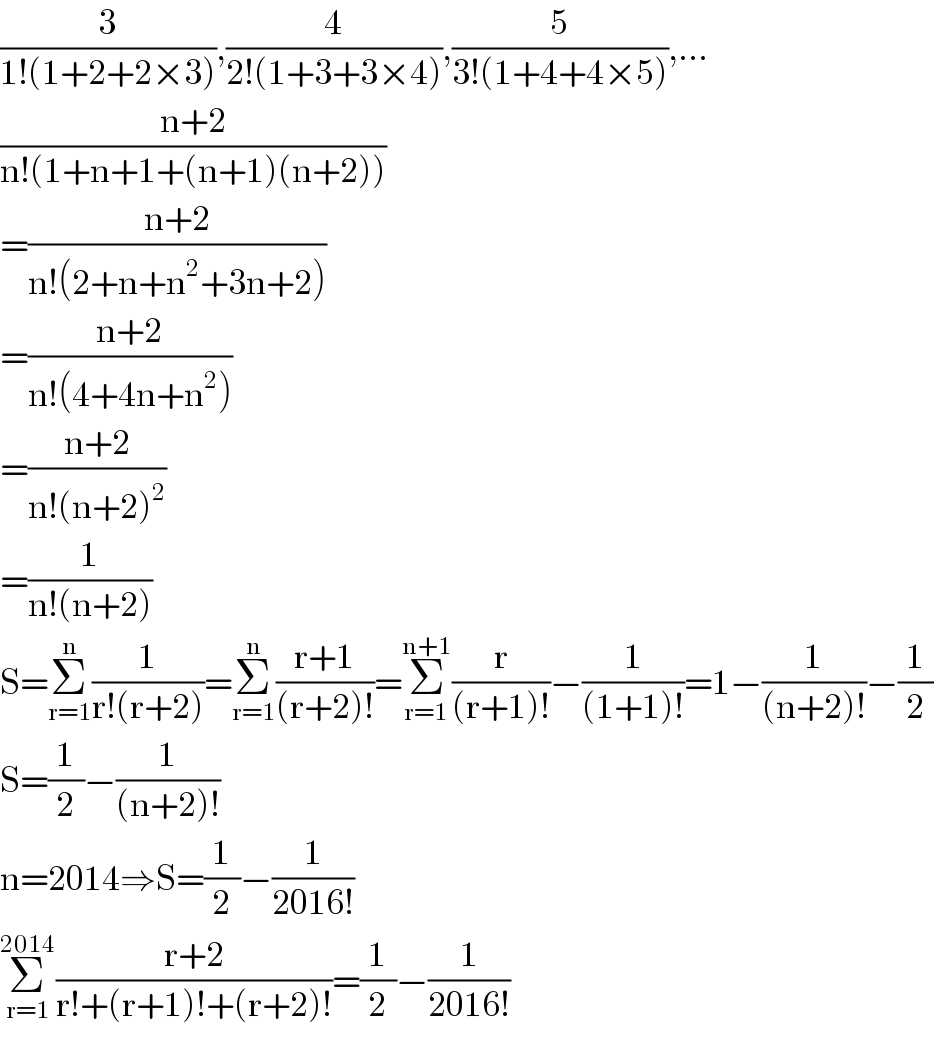
Question Number 8554 by Sopheak last updated on 16/Oct/16

$${Problem}\:.\mathrm{15} \\ $$$${Find}\:{the}\:{sum}\:{of} \\ $$$${S}=\:\frac{\mathrm{3}}{\mathrm{1}!+\mathrm{2}!+\mathrm{3}!}+\frac{\mathrm{4}}{\mathrm{2}!+\mathrm{3}!+\mathrm{4}!}+\frac{\mathrm{5}}{\mathrm{3}!+\mathrm{4}!+\mathrm{5}!}+...+\frac{\mathrm{2016}}{\mathrm{2014}!+\mathrm{2015}!+\mathrm{2016}!} \\ $$$$\: \\ $$
Commented by Yozzias last updated on 16/Oct/16

$$\frac{\mathrm{3}}{\mathrm{1}!\left(\mathrm{1}+\mathrm{2}+\mathrm{2}×\mathrm{3}\right)},\frac{\mathrm{4}}{\mathrm{2}!\left(\mathrm{1}+\mathrm{3}+\mathrm{3}×\mathrm{4}\right)},\frac{\mathrm{5}}{\mathrm{3}!\left(\mathrm{1}+\mathrm{4}+\mathrm{4}×\mathrm{5}\right)},... \\ $$$$\frac{\mathrm{n}+\mathrm{2}}{\mathrm{n}!\left(\mathrm{1}+\mathrm{n}+\mathrm{1}+\left(\mathrm{n}+\mathrm{1}\right)\left(\mathrm{n}+\mathrm{2}\right)\right)} \\ $$$$=\frac{\mathrm{n}+\mathrm{2}}{\mathrm{n}!\left(\mathrm{2}+\mathrm{n}+\mathrm{n}^{\mathrm{2}} +\mathrm{3n}+\mathrm{2}\right)} \\ $$$$=\frac{\mathrm{n}+\mathrm{2}}{\mathrm{n}!\left(\mathrm{4}+\mathrm{4n}+\mathrm{n}^{\mathrm{2}} \right)} \\ $$$$=\frac{\mathrm{n}+\mathrm{2}}{\mathrm{n}!\left(\mathrm{n}+\mathrm{2}\right)^{\mathrm{2}} } \\ $$$$=\frac{\mathrm{1}}{\mathrm{n}!\left(\mathrm{n}+\mathrm{2}\right)} \\ $$$$\mathrm{S}=\underset{\mathrm{r}=\mathrm{1}} {\overset{\mathrm{n}} {\sum}}\frac{\mathrm{1}}{\mathrm{r}!\left(\mathrm{r}+\mathrm{2}\right)}=\underset{\mathrm{r}=\mathrm{1}} {\overset{\mathrm{n}} {\sum}}\frac{\mathrm{r}+\mathrm{1}}{\left(\mathrm{r}+\mathrm{2}\right)!}=\underset{\mathrm{r}=\mathrm{1}} {\overset{\mathrm{n}+\mathrm{1}} {\sum}}\frac{\mathrm{r}}{\left(\mathrm{r}+\mathrm{1}\right)!}−\frac{\mathrm{1}}{\left(\mathrm{1}+\mathrm{1}\right)!}=\mathrm{1}−\frac{\mathrm{1}}{\left(\mathrm{n}+\mathrm{2}\right)!}−\frac{\mathrm{1}}{\mathrm{2}} \\ $$$$\mathrm{S}=\frac{\mathrm{1}}{\mathrm{2}}−\frac{\mathrm{1}}{\left(\mathrm{n}+\mathrm{2}\right)!} \\ $$$$\mathrm{n}=\mathrm{2014}\Rightarrow\mathrm{S}=\frac{\mathrm{1}}{\mathrm{2}}−\frac{\mathrm{1}}{\mathrm{2016}!} \\ $$$$\underset{\mathrm{r}=\mathrm{1}} {\overset{\mathrm{2014}} {\sum}}\frac{\mathrm{r}+\mathrm{2}}{\mathrm{r}!+\left(\mathrm{r}+\mathrm{1}\right)!+\left(\mathrm{r}+\mathrm{2}\right)!}=\frac{\mathrm{1}}{\mathrm{2}}−\frac{\mathrm{1}}{\mathrm{2016}!} \\ $$
Answered by Yozzias last updated on 16/Oct/16

$$\mathrm{Check}\:\mathrm{answer}\:\mathrm{in}\:\mathrm{comments}. \\ $$
Commented by Sopheak last updated on 16/Oct/16

$${Right}\:{answer} \\ $$
